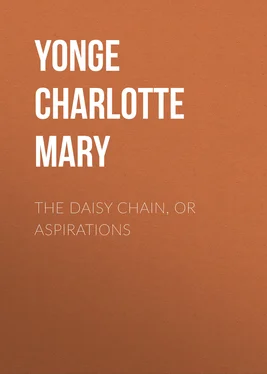Charlotte Yonge - The Daisy Chain, or Aspirations
Здесь есть возможность читать онлайн «Charlotte Yonge - The Daisy Chain, or Aspirations» — ознакомительный отрывок электронной книги совершенно бесплатно, а после прочтения отрывка купить полную версию. В некоторых случаях можно слушать аудио, скачать через торрент в формате fb2 и присутствует краткое содержание. Жанр: foreign_prose, literature_19, Европейская старинная литература, foreign_antique, на английском языке. Описание произведения, (предисловие) а так же отзывы посетителей доступны на портале библиотеки ЛибКат.
- Название:The Daisy Chain, or Aspirations
- Автор:
- Жанр:
- Год:неизвестен
- ISBN:нет данных
- Рейтинг книги:5 / 5. Голосов: 1
-
Избранное:Добавить в избранное
- Отзывы:
-
Ваша оценка:
- 100
- 1
- 2
- 3
- 4
- 5
The Daisy Chain, or Aspirations: краткое содержание, описание и аннотация
Предлагаем к чтению аннотацию, описание, краткое содержание или предисловие (зависит от того, что написал сам автор книги «The Daisy Chain, or Aspirations»). Если вы не нашли необходимую информацию о книге — напишите в комментариях, мы постараемся отыскать её.
The Daisy Chain, or Aspirations — читать онлайн ознакомительный отрывок
Ниже представлен текст книги, разбитый по страницам. Система сохранения места последней прочитанной страницы, позволяет с удобством читать онлайн бесплатно книгу «The Daisy Chain, or Aspirations», без необходимости каждый раз заново искать на чём Вы остановились. Поставьте закладку, и сможете в любой момент перейти на страницу, на которой закончили чтение.
Интервал:
Закладка:
“Where is he?”
“In the drawing-room.”
Norman paused to ask what he was to say.
“Nothing,” said Mary, “nobody can do anything. Make haste. Don’t you want a candle?”
“No, thank you, I had rather be in the dark. Come up as soon as you have seen him,” said Etheldred.
Norman went slowly down, with failing knees, hardly able to conquer the shudder that came over him, as he passed those rooms. There were voices in the drawing-room, and he found a sort of council there, Alan Ernescliffe, the surgeon, and Mr. Wilmot. They turned as he came in, and Mr. Wilmot held out his hand with a look of affection and kindness that went to his heart, making room for him on the sofa, while going on with what he was saying. “Then you think it would be better for me not to sit up with him.”
“I should decidedly say so,” replied Mr. Ward. “He has recognised Mr. Ernescliffe, and any change might excite him, and lead him to ask questions. The moment of his full consciousness is especially to be dreaded.”
“But you do not call him insensible?”
“No, but he seems stunned—stupified by the shock, and by pain. He spoke to Miss Flora when she brought him some tea.”
“And admirably she managed,” said Alan Ernescliffe. “I was much afraid of some answer that would rouse him, but she kept her self-possession beautifully, and seemed to compose him in a moment.”
“She is valuable indeed—so much judgment and activity,” said Mr. Ward. “I don’t know what we should have done without her. But we ought to have Mr. Richard—has no one sent to him?”
Alan Ernescliffe and Norman looked at each other.
“Is he at Oxford, or at his tutor’s?” asked Mr. Wilmot.
“At Oxford; he was to be there to-day, was he not, Norman?”
“What o’clock is it? Is the post gone—seven—no; it is all safe,” said Mr. Ward.
Poor Norman! he knew he was the one who ought to write, but his icy trembling hand seemed to shake more helplessly than ever, and a piteous glance fell upon Mr. Wilmot.
“The best plan would be,” said Mr. Wilmot, “for me to go to him at once and bring him home. If I go by the mail-train, I shall get to him sooner than a letter could.”
“And it will be better for him,” said Mr. Ward. “He will feel it dreadfully, poor boy. But we shall all do better when we have him. You can get back to-morrow evening.”
“Sunday,” said Mr. Wilmot, “I believe there is a train at four.”
“Oh! thank you, sir,” said Norman.
“Since that is settled, perhaps I had better go up to the doctor,” said Alan; “I don’t like leaving Flora alone with him,” and he was gone.
“How fortunate that that youth is here,” said Mr. Wilmot—“he seems to be quite taking Richard’s place.”
“And to feel it as much,” said Mr. Ward. “He has been invaluable with his sailor’s resources and handiness.”
“Well, what shall I tell poor Richard?” asked Mr. Wilmot.
“Tell him there is no reason his father should not do very well, if we can keep him from agitation—but there’s the point. He is of so excitable a constitution, that his faculties being so far confused is the best thing, perhaps, that could be. Mr. Ernescliffe manages him very well—used to illness on that African coast, and the doctor is very fond of him. As to Miss May, one can’t tell what to say about her yet—there’s no fracture, at least—it must be a work of time to judge.”
Flora at that moment half-opened the door, and called Mr. Ward, stopping for a moment to say it was for nothing of any consequence. Mr. Wilmot and Norman were left together. Norman put his hands over his face and groaned—his master looked at him with kind anxiety, but did not feel as if it were yet time to speak of consolation.
“God bless and support you, and turn this to your good, my dear boy,” said he affectionately, as he pressed his hand; “I hope to bring your brother to-morrow.”
“Thank you, sir,” was all Norman could say; and as Mr. Wilmot went out by the front door, he slowly went up again, and, lingering on the landing-place, was met by Mr. Ward, who told him to his relief—for the mere thinking of it renewed the faint sensation—that he had better not go to his father’s room.
There was nothing to be done but to return to Ethel and Harry, and tell them all; with some humiliation at being helpless, where Flora was doing so much, and to leave their father to be watched by a stranger. If he had been wanted, Norman might have made the effort, but being told that he would be worse than useless, there was nothing for him but to give way.
They sat together in Ethel’s room till somewhere between eight and nine o’clock, when good old nurse, having put her younger ones to bed, came in search of them. “Dear, dear! poor darlings,” said she, as she found them sitting in the dark; she felt their cold hands, and made them all come into the nursery, where Mary was already, and, fondling them, one by one, as they passively obeyed her, she set them down on their little old stools round the fire, took away the high fender, and gave them each a cup of tea. Harry and Mary ate enough to satisfy her, from a weary craving feeling, and for want of employment; Norman sat with his elbow on his knee, and a very aching head resting on his hand, glad of drink, but unable to eat; Ethel could be persuaded to do neither, till she found old nurse would let her have no peace.
The nurse sent them all to bed, taking the two girls to their own room, undressing them, and never leaving them until Mary was in a fair way of crying herself to sleep—for saying her prayers had brought the tears; while Ethel lay so wide awake that it was of no use to wait for her, and then she went to the boys, tucked them each in, as when they were little children, and saying, “Bless your dear hearts!” bestowed on each of them a kiss which came gratefully to Norman’s burning brow, and which even Harry’s boyish manliness could not resist.
Flora was in Margaret’s room, too useful to be spared.
So ended that dreadful Saturday.
CHAPTER IV
They may not mar the deep repose
Of that immortal flower:
Though only broken hearts are found
To watch her cradle by,
No blight is on her slumbers found,
No touch of harmful eye.
Such a strange sad Sunday! No going to church, but all the poor children moving in awe and oppression about the house, speaking under their breath, as they gathered in the drawing-room. Into the study they might not go, and when Blanche would have asked why, Tom pressed her hand and shuddered.
Etheldred was allowed to come and look at Margaret, and even to sit in the room for a little while, to take the place of Miss Winter; but she was not sensible of sufficient usefulness to relieve the burden of fear and bewilderment in the presence of that still, pale form; and, what was almost worse, the sight of the familiar objects, the chair by the fire, the sofa, the books, the work-basket, the letter-case, the dressing things, all these were too oppressive. She sat crouched up, with her face hidden in her hands, and the instant she was released, hastened back to Norman. She was to tell him that he might go into the room, but he did not move, and Mary alone went in and out with messages.
Dr. May was not to be visited, for he was in the same half-conscious state, apparently sensible only of bodily suffering, though he answered when addressed, and no one was trusted to speak to him but Flora and Ernescliffe.
The rest wore through the day as best they might. Harry slept a good deal, Ethel read to herself, and tried to get Norman to look at passages which she liked, Mary kept the little ones from being troublesome, and at last took them to peep behind the school-room blinds for Richard’s coming.
Читать дальшеИнтервал:
Закладка:
Похожие книги на «The Daisy Chain, or Aspirations»
Представляем Вашему вниманию похожие книги на «The Daisy Chain, or Aspirations» списком для выбора. Мы отобрали схожую по названию и смыслу литературу в надежде предоставить читателям больше вариантов отыскать новые, интересные, ещё непрочитанные произведения.
Обсуждение, отзывы о книге «The Daisy Chain, or Aspirations» и просто собственные мнения читателей. Оставьте ваши комментарии, напишите, что Вы думаете о произведении, его смысле или главных героях. Укажите что конкретно понравилось, а что нет, и почему Вы так считаете.












